Diplomatic Bluebook 2020
Chapter 3
Japan's Foreign Policy to Promote National and Global Interests
2 Response to Global Issues
(1) 2030 Agenda for Sustainable Development
The “2030 Agenda for Sustainable Development (the 2030 Agenda)” is a set of international development goals to be achieved by 2030, which was adopted by the UN Summit in September 2015 as a successor to the Millennium Development Goals (MDGs) formulated in 2001. The 2030 Agenda sets out the international development goal of realizing a society that is sustainable, diverse, and inclusive, and where “no one is left behind,” by 2030.
The 2030 Agenda lists the “Sustainable Development Goals (SDGs)” consisting of 17 goals and 169 targets that are interrelated and closely linked to each other, and which serve as development goals for the whole of the international community including developed countries.
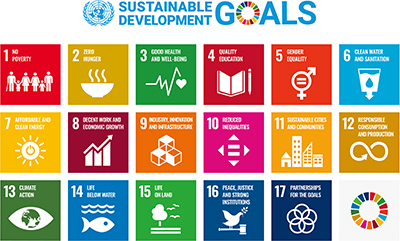 Logo for all 17 SDGs goals(Source: United Nations Information Center)
Logo for all 17 SDGs goals(Source: United Nations Information Center)After the adoption of the 2030 Agenda, Japan first built a foundation for the implementation of the SDGs by establishing the SDGs Promotion Headquarters headed by the Prime Minister and composed of all cabinet ministers as members, formulating the SDGs Implementation Guiding Principles that set out Japan's medium- to long-term strategy toward the achievement of the SDGs, and establishing eight priority areas that Japan will place particular focus on. Furthermore, Japan puts great importance on public-private partnership for the implementation of the SDGs, and has to date held nine Round Table Meetings on the promotion of the SDGs, bringing together stakeholders from a wide range of fields including the private sector, civil society, experts, and international organizations. It also engages in the exchange of views on initiatives by local governments and businesses toward the promotion of the SDGs, measures for the empowerment of women and the next generation, and strengthening cooperation with the international community.
To date, eight meetings of the SDGs Promotion Headquarters have been held. At the eighth meeting held in December 2019, the SDGs Implementation Guiding Principles were revised for the first time in three years since their formulation in 2016, based on the outcomes of the G20 Osaka Summit and the SDG Summit 2019, as well as the recommendations by members of the Round Table Meetings and all stakeholders. In addition, the key initiatives of MOFA and the relevant government ministries and agencies toward the achievement of the SDGs were published in the SDGs Action Plan 2020. This Action Plan sets out three pillars for Japan's SDGs: (i) business and innovation; (ii) regional revitalization; and, (iii) empowerment of the next generation and women. In line with these, Japan will further promote efforts toward the achievement of the SDGs in both the aspects of domestic implementation and international cooperation.
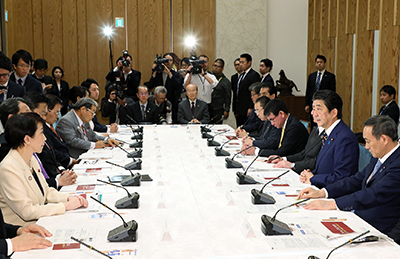 8th meeting of the SDGs Promotion Headquarters
8th meeting of the SDGs Promotion Headquarters (December 20, Tokyo; Photo: Cabinet Public Relations Office)
On the same day as the eighth meeting of the SDGs Promotion Headquarters, the conferment ceremony for the third Japan SDGs Award was held to commend companies and organizations that have put in place excellent initiatives toward the realization of the SDGs. This year, Uomachi Shopping District Organization (Kitakyushu City, Fukuoka Prefecture) received the SDGs Promotion Headquarters Chief's (Prime Minister's) Award for its efforts to implement the “SDGs Declaration” as a shopping district, and to engage in people- and environmentally-friendly activities through events and services.
At the G20 Osaka Summit held in June, the SDGs were raised as one of the main agenda items, and the “Osaka Update” was adopted, setting out the renewed resolve by the G20 to play a leading role in achieving the SDGs, and summarizing the G20's initiatives in areas such as health, education, and quality infrastructure. In September, the SDG Summit 2019 was held to coincide with the UN General Assembly. During this Summit, Prime Minister Abe communicated information about Japan's initiatives (see the Special Feature on page 251). Japan will continue to present to the world its stance as a strong leader in the promotion of the SDGs in various opportunities.
On the other hand, to achieve the SDGs by 2030, it has been estimated that there is an annual funding shortfall of approximately 2.5 trillion US dollars (approximately 280 trillion yen) every year, and the G20 Osaka Leaders' Declaration clearly sets out the importance of innovative financing to overcome this financing gap. In September, Japan chaired a high-level meeting of the Leading Group on Innovative Financing for Development in New York, a group that is made up of voluntary countries and organizations, and is advancing reviews on innovative financing for the achievement of the SDGs.
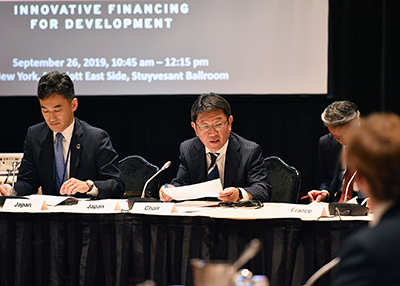 Meeting of the Leading Group on Innovative Financing for Development (September 26, New York, U.S.)
Meeting of the Leading Group on Innovative Financing for Development (September 26, New York, U.S.)In September 2019, SDG Summit 2019 was held at the UN Headquarters in New York, with the aim of following up, at the leader's level, the SDGs initiatives implemented over the past four years, as well as increasing momentum toward the achievement of the SDGs. Since the adoption of the 2030 Agenda for Sustainable Development in 2015, and the agreement by all UN member states on the SDGs that set out the future vision of the Earth for 2030 and beyond, the world has swiftly begun moving toward the achievement of these common goals. We now stand just over a quarter of the way on our path toward their achievement.
SDG Summit 2019
At the SDG Summit 2019, UN Secretary-General Guterres announced the designation of the decade leading up to 2030, as the “Decade of Action” toward the achievement of the SDGs. At the Summit, Prime Minister Abe shared with the participating leaders the initiatives that he had led as chair of the G20 Osaka Summit (June) and TICAD7 (August) held in Japan. These included initiatives in the areas of environment, education, health, disaster risk reduction, and quality infrastructure investment. In addition, as the head of the SDGs Promotion Headquarters of the Government of Japan, he announced the firm resolve to accelerate efforts in and out of Japan by the next SDG Summit, including those by the private sector and in regional revitalization programs. He also introduced a “SDGs Model,” which Japan is now implementing with three pillars: (1) Business and innovation; (2) Regional revitalization; and, (3) Empowerment of next generations and women.
Japan's initiatives toward the achievement of the SDGs
In order to promote the SDGs in Japan, the government's first initiative was to develop the domestic infrastructure. The SDGs Promotion Headquarters was established in 2016, with the Prime Minister as its head, the Chief Cabinet Secretary and Foreign Minister as the deputy heads, and all Cabinet ministers as members. Under this organization, the SDGs Promotion Roundtable Meeting comprising a wide range of stakeholders including the private sector, civil society, experts, international organizations and various organizations, engaged in discussions and formulated the SDGs Implementation Guiding Principles as a national strategy toward the achievement of the SDGs, as well as the SDGs Action Plan with concrete measures. At the eighth SDGs Promotion Meeting convened in December 2019, the SDGs Implementation Guiding Principles were revised to take into account initiatives taken over the past four years and the latest trends in the international community. Furthermore, under the SDGs Action Plan 2020, the group renewed its resolve to further accelerate the widespread roll-out of Japan's SDGs Model.
For example, as prescribed in the new curriculum guidelines to be fully implemented at elementary schools from FY2020 and junior high schools from FY2021, it is required for schools to educate each student for being a creator of sustainable society in the future. This is expected to raise awareness of the SDGs among the young and their parents, and to encourage the generations that have learnt about the SDGs in school to play an active role in 2030 and beyond.
There are contributions that Japan can make toward the realization of a society where “no one is left behind.” Under this strong resolve, Japan will exert its leadership amidst this global trend, and continue to push forward in its efforts to strengthen its initiatives in Japan and overseas.
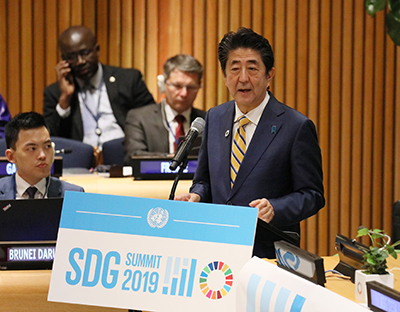
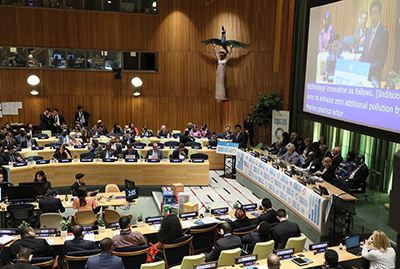 SDG Summit (September 24, New York, U.S.; Photo: Cabinet Public Relations Office)
SDG Summit (September 24, New York, U.S.; Photo: Cabinet Public Relations Office)A Human Security
Human security is a concept aiming at creating a community in which people can fully develop their rich potential through protecting all individuals, and at the same time empowering them to solve their own problems. Japan positions human security as a guiding principle that lies at the roots of Japan's development cooperation in the Development Cooperation Charter approved in 2015. Japan has led discussions on human security in the UN, and supported the dissemination and implementation of the concept of human security by UN organizations through the contribution of a cumulative total of about 47.6 billion yen to the UN Human Security Trust Fund established in 1999 by Japan's initiative. In the area of bilateral cooperation, Japan has also put effort into the dissemination and implementation of this concept through support for Grant Assistance for Grassroots Human Security Projects. The SDGs, which advocate a people-centered approach and the vision of leaving no one behind, also position human security at its core. In February 2019, the Government of Japan co-hosted the High-Level Event “Human Security at 25” with the United Nations Development Program (UNDP), the UN Human Security Unit and the relevant countries, at the UN Headquarters in New York. Marking the 25th anniversary since the introduction of the concept of human security into the international community, this meeting looked back on the history of human security, and affirmed that the human security approach is becoming increasingly important in the era of the SDGs.
B Approaches in the Area of Disaster Risk Reduction
200 million people around the world are affected by disasters every year (90% of the victims are citizens of developing countries) and the annual average loss incurred by natural hazards extends to approximately 140 billion US dollars according to estimates by the United Nations Office for Disaster Risk Reduction (UNDRR). Disaster risk reduction is essential for realizing poverty eradication and sustainable development.
Japan makes the most of the expertise in disaster risk reduction, built up through its numerous experiences with disasters, to actively promote international cooperation. At the Third United Nations World Conference on Disaster Risk Reduction held in Sendai in March 2015, Japan took the lead in the adoption of the “Sendai Framework for Disaster Risk Reduction 2015-2030,” a guideline for efforts by the international community. Japan also announced the “Sendai Cooperation Initiative for Disaster Risk Reduction” as its independent contribution, which includes provision of 4 billion US dollars toward cooperation and training of 40,000 people in the four years from 2015 to 2018. With the achievement of these goals, the Sendai Cooperation Initiative for Disaster Risk Reduction Phase 2 was announced in June 2019, under which Japan plans to provide support to at least 5 million people from 2019 to 2022, in areas such as flood measures.
Coinciding with World Tsunami Awareness Day (November 5), proposed by Japan and enacted unanimously at the 70th UN General Assembly held in December 2015, Japan has been hosting the High School Students Summit on “World Tsunami Awareness Day” since 2016. Held every year, high school students from countries around the world are invited to this event, and through practical learning about Japan's history of tsunami, recovery from earthquake disasters, and preparations for a possible Nankai Trough earthquake, the participants make proposals for future challenges and implementation in their home countries.
Japan will continue to share the experiences and lessons drawn from past disasters with the world, and to promote the “mainstreaming of disaster risk reduction” that incorporates the perspectives of disaster risk reduction in the policies of every country.
C Approaches in the Area of Education
In the area of education, Japan is engaged in various forms of educational support around the world under the “Learning Strategy for Peace and Growth,” announced by Japan in line with the timing for the adoption of the 2030 Agenda in September 2015. Japan also participates actively in meetings related to support for education, including the Global Partnership for Education (GPE).7 At the World Assembly for Women (WAW!) (see Chapter 3, Section 1 (8)(3)) held in March 2019, Prime Minister Abe announced that Japan will continue its efforts to provide opportunities for quality education and training to at least 4 million women in developing countries by 2020. Furthermore, at the meeting of the SDGs Promotion Headquarters held immediately prior to the G20 Osaka Summit in June, Japan announced its commitment to the “Education x Innovation” initiative, which aims to provide education for innovation, and education through innovation to at least 9 million children and youths. At the G20 Osaka Summit chaired by Japan, an agreement was reached on the “G20 Initiative on Human Capital Investment for Sustainable Development,” which places the focus on education, and the commitment to invest in human capital and promote access to inclusive, equitable and quality education for all people was affirmed in the Initiative.
- 7 GPE: An international partnership to support the education sector in developing countries, with the participation of developing countries, donor countries and organizations, civil society, etc. Focusing on support for primary education, it implements support for post-primary education, preschool education, education for women, and education in areas affected by conflict.
D Approaches in Agricultural Areas
In coordination with the relevant countries, such as G7 or G20 member states and international organizations, Japan has delivered assistance for agriculture and rural development in developing countries. The G20 Niigata Agriculture Ministers' Meeting was held in May, during which the participants affirmed the importance of various issues related to agriculture and food, such as new technology and the creation of human resources, food value chains, and the SDGs. The G20 Niigata Agriculture Ministers' Declaration 2019 was also adopted.
E Approaches in the Area of Water
Japan has continuously been the largest donor country in the area of water since the 1990s and has implemented high quality assistance utilizing Japan's experiences, expertise, and technologies. Japan proactively participates in discussions in the international community, and tackles global issues in the area of water building upon its contributions to date. There was a plan to hold the 4th Asia-Pacific Water Summit in Kumamoto, in October 2020, but this has been postponed for about a year in view of the situation of the novel coronavirus disease outbreak.
(2) Global Health
Overcoming health issues that threaten lives and hinder all kinds of social, cultural and economic activities is a common global challenge directly linked to human security. Japan advocates human security, as a foundation of the “Proactive Contribution to Peace,” and has acted in support of that principle. Japan regards health as a central element of human security. Japan has become a society of the most healthy and active ageing and is further expected to play a proactive role in the area of health. Japan aims to improve people's health and realize an international community that ensures the right to health through assistance in the area of health.
Under this principle, Japan has achieved remarkable results in overcoming health issues such as infectious diseases, maternal and child health, and nutrition improvements through cooperation with a number of countries and various international organizations, including the World Health Organization (WHO); the World Bank; the Global Fund to Fight AIDS, Tuberculosis and Malaria (the Global Fund); Gavi, the Vaccine Alliance; the United Nations Population Fund (UNFPA); the United Nations Children's Fund (UNICEF); and the Global Health Innovative Technology Fund (GHIT).
Bearing in mind the achievement of Universal Health Coverage (UHC) that ensures the provision of basic health services throughout a life, for everyone, Japan has demonstrated leadership and has taken the lead in international discussions based on the “Basic Design for Peace and Health,” a theme-based policy for the Development Cooperation Charter formulated in 2015.
At the G20 Osaka Summit held in June 2019, Japan, as the Presidency, included the achievement of UHC, aging population, and the health crisis as one of the main agenda items, and held the inaugural G20 Joint Session of Finance and Health Ministers to promote sustainable health financing. At the TICAD7 held in Yokohama in August, Japan also characterised health as one of the pillars of the foundation for realizing sustainable economic growth. Furthermore, Prime Minister Abe attended the UN General Assembly High-Level Meeting on UHC in September, where he emphasized the importance of promoting cross-sectoral initiatives for areas such as nutrition, water and hygiene, as well as strengthening health financing. The political declaration for this High-Level Meeting reaffirmed the goals of providing basic health care to all people and eradicating impoverishment due to health-related expenses by 2030 (see the Special Feature on page 255).
Japan positioned nutrition, one of the cross-sectoral initiatives, as an issue that is related to human security and indispensable for the achievement of the SDGs, and has been advocating the importance of nutrition at the UN and other fora with a view to hosting the Tokyo Nutrition for Growth Summit.
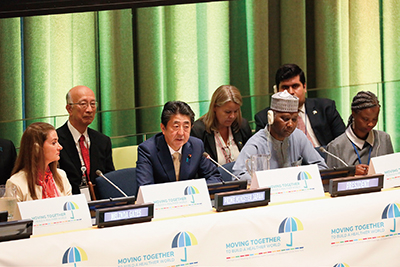 Prime Minister Abe presenting his speech at the UN High-Level Meeting on Universal Health Coverage (UHC) (September 23, New York, U.S.; Photo: Cabinet Public Relations Office)
Prime Minister Abe presenting his speech at the UN High-Level Meeting on Universal Health Coverage (UHC) (September 23, New York, U.S.; Photo: Cabinet Public Relations Office)Universal Health Coverage (UHC) means that all people can access quality essential health services at an affordable cost. In September 2019, a High-Level Meeting on UHC was held for the first time at the UN General Assembly.
UHC has been established as one of the Sustainable Development Goals (SDGs) adopted by the UN in 2015, and the international community aims to achieve UHC by 2030.
Japan achieved UHC with the introduction of a national health insurance system in 1961. The realization of UHC has made significant contributions to Japan's economic growth and social stability. Based on this experience, Japan has been proactively engaged in promoting UHC in the international community. Strengthening of health systems was advocated at the G8 Hokkaido Toyako Summit in 2008, and at the G7 Ise-Shima Summit in 2016, UHC was included in the main agenda of a leader's level meeting for the first time and the G7 Ise-Shima Vision was adopted. The UHC Forum 2017 was held in Tokyo in 2017, where the Tokyo Declaration on Universal Health Coverage, which incorporated concrete initiatives such as securing sustainable financial resources, was adopted. Furthermore, the first G20 Joint Session of Finance and Health Ministers was held to discuss the importance of cooperation among financial and health authorities to promote UHC at the G20 Osaka Summit in June 2019.
With the growing political momentum toward promoting UHC in the international community as a result of Japan's sustained and proactive initiatives, the first High-Level Meeting on UHC was held at the UN General Assembly in September 2019, and the Political Declaration was endorsed. While more than 50 leaders and 85 ministers attended the event, Prime Minister Abe gave the closing speech at the Closing Ceremony on behalf of the member countries. In his speech, he emphasized the importance of UHC, health financing as well as promoting cross-sectoral initiatives in areas such as health, nutrition, water and sanitation.
In order to achieve UHC, cooperation among a wide range of stakeholders is indispensable. This includes not only governments, but also civil society, the private-sector, and international organizations. The voices of these stakeholders were also actively incorporated in the Political Declaration. Japan also established the “Group of Friends of UHC” as a UN platform, where it played a central role in developing the text for the Political Declaration.
The Political Declaration warns of the severe situation currently facing the world, stating that “at least half of the world's population lack access to essential health services […] and out of pocket expenses drive almost 100 million people into poverty each year.” It also sounds an alarm bell, emphasizing that “at the current pace, up to one third of the world's population will remain underserved by 2030, and acceleration of taking measures is urgently needed.” To address the current severe situation, it reaffirms the target of covering all people with essential health services by 2030, and eradicating poverty caused by the payment of out-of-pocket health expenditure, and establishes concrete initiatives including additional investment in public health and creating employment for health workers.
Hence, the Political Declaration expresses the strong will of the international community to achieve UHC. Now that the Political Declaration has been adopted, each country faces the important challenge of transforming that into concrete action.
(3) Labor and Employment
It is important to raise income levels through employment, in order to raise the living standards of those living in poverty. Against the background of an expanding supply-chain worldwide, it is necessary to put effort into developing the labor environment, and to realize “decent work” (work that is of an acceptable quality for motivated human beings) around the world. The realization of “decent work” has been positioned as a primary objective of the activities of the International Labor Organization (ILO), which marks its centenary year in 2019.
In view of this, Japan is also engaged in development cooperation in the field of labor. In 2019, Japan offered technical cooperation to developing countries in the Asia Pacific region, including support for the urgent creation of employment in the aftermath of a natural disaster, the development of labor laws, and improvement of enforcement systems for labor, health and safety, by making voluntary contributions to the ILO and providing support to networks of international labor organizations.
In January, the second Japan-ILO Annual Strategic Consultation Meeting was held in Tokyo. Taking the opportunities presented by the centenary year of ILO's founding, the G20 Osaka Summit, the G20 Matsuyama Labour and Employment Ministers' Meeting, and TICAD7, Japan and the ILO affirmed the following points: (i) further strengthening of cooperation on the “Future of Work” initiative;8 (ii) Japan's financial and human resource contributions to date through its development cooperation support in the field of employment, and further strengthening of the partnership; and, (iii) adopting joint concrete action toward further reinforcement of Japanese staff in the ILO.
- 8 An initiative by ILO aimed at understanding the ever-changing world of work, engaging in discussions on policies that will determine society in the future, and widely reviewing opportunities and issues on the future of work.
(4) Environmental Issues and Climate Change
A Global Environmental Issues
Awareness is building worldwide on the importance of addressing global environmental issues, as exemplified by the 2030 Agenda, which ascribes environmental goals. Japan is committed to conserving the natural environment and realizing sustainable development through active participation in multilateral environmental negotiations and engagements with other contracting parties to various environmental treaties. Japan is also contributing to projects that are addressing global environmental issues, and is the largest donor to the World Bank Group's Global Environment Facility, a financing mechanism for the treaties on biodiversity, climate change, land degradation and chemical contamination.
(A) Conservation of the Marine Environment
Addressing the problem of marine plastic litter is growing in importance in recent years, given its potential adverse impact on marine ecology, tourism, fisheries, and human health. These issues are caused by factors such as the illegal dumping of waste and incomplete waste disposal. At the G20 Osaka Summit held in June, Prime Minister Abe, with other leaders of the G20, orchestrated a common vision, “the Osaka Blue Ocean Vision,” which aims to reduce additional pollution by marine plastic litter to zero by 2050. Leaders agreed on a concrete implementation framework toward the achievement of this Vision, and Japan announced the Marine Initiative (see the Special Feature on page 257), an assistance program designed to support capacity building and infrastructure development on waste management in developing countries, to reinforce the achievement of this vision. As part of the package, Japan announced that it will nurture 10,000 waste management specialists worldwide by 2025. A follow-up meeting was convened in October 2019, based on the implementation framework, leading to a report on the measures of tackling marine plastic litter, compiling knowledge and lessons learned on voluntary initiatives conducted by each country.
With a view to further leveraging the outcomes of the G20 Osaka Summit on promoting international cooperation in marine plastic litter, Japan called for embracement of the Osaka Blue Ocean Vision and its implementation framework, at the ASEAN Plus 3 (Japan, China, and the Republic of Korea) Summit in November 2019. Furthermore, under the ASEAN+3 Marine Plastics Debris Cooperative Action Initiative launched in 2018, Japan announced reinforced cooperation measures, including support to drafting national plans for waste management and establishing the Regional Knowledge Centre for Marine Plastic Debris under the auspices of the Economic Research Institute for ASEAN and East Asia (ERIA).
The High-Level Panel for a Sustainable Ocean Economy (comprising leaders of maritime nations) was established to discuss matters such as the conservation of the marine environment, the fishery industries and the utilization of marine resources, with a view to contributing toward the achievement of the SDGs. At the second meeting of the Panel which was held in New York, U.S., in September, Prime Minister Abe, in his message for the meeting, shared the outcomes of the G20 Osaka Summit with panel members, emphasizing the importance of initiatives related to marine plastic litter and illegal, unreported and unregulated fishing (IUU).
In recent years, the marine plastic litter problem has been attracting much attention both in Japan and abroad. There are worries that the discharge of such litter into rivers and seas as a result of acts such as incomplete disposal of plastic products, littering, and illegal dumping, can have an adverse impact on marine ecosystems, tourism, fisheries, and the aquaculture industry. There are also concerns that fine particles known as microplastics can be accidentally consumed by fish. Consequently, the chemical substances that adhere to the microplastics are absorbed into the food chain, which can then have a negative impact on human health.
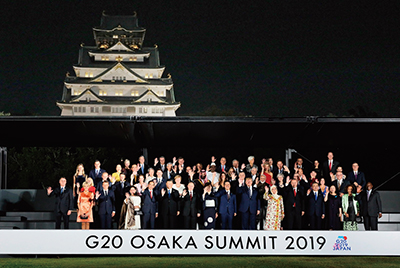 G20 Osaka Summit (June 28, Osaka; Photo: Cabinet Public Relations Office)
G20 Osaka Summit (June 28, Osaka; Photo: Cabinet Public Relations Office)It is estimated that G7 countries generate about 2% of all marine plastic litter, while G20 countries make up approximately 48% of all marine plastic litter. Hence, it is vital for the international community as a whole to address and resolve the marine plastic litter problem. At the G20 Osaka Summit, which garnered participation from emerging and developing countries, Japan, under its Presidency, demonstrated its leadership in drafting the Osaka Blue Ocean Vision, which aims to reduce additional pollution from marine plastic litter to zero by 2050.
During this Summit, Prime Minister Abe announced the launch of the MARINE Initiative as Japan's own effort to materialize this Vision. The initiative is based on the understanding that reducing the amount of marine plastic litter worldwide cannot be achieved through one country's efforts alone; it recognizes the need to assist developing countries' efforts to put in place measures to prevent further discharges of marine plastic litter. In acknowledgement of this reality, Japan seeks to leverage its ODA programs and other means to help improve waste management in developing countries, focusing on the following areas:
MARINE Initiative
(1) Management of Wastes
(2) Recovery of marine litter
(3) Innovation
(4) Empowerment
As a part of this Initiative, Japan is committed to training 10,000 officials engaging in waste management worldwide by 2025. In June, Japan decided to provide assistance toward expanding the use of marine biodegradable plastic in South Africa, and has plans to implement various other projects under this Initiative.
To date, Japan has consistently and proactively addressed the problem of marine pollution. For example, since 2004, Japan has supported Bangladesh, where plastic litter discarded in rivers has caused serious marine pollution in the Bay of Bengal. Japan has supported Bangladesh, for example, by training sanitation staff and providing equipment such as waste collection vehicles. Through this support, Dhaka's waste collection rate, which had been 44% in 2004, improved to 80% by 2018, thus helping to reduce pollution in the Bay of Bengal by a significant margin.
Japan will continue to take a proactive approach toward addressing the marine plastic litter problem by leveraging the technology and experience it has built up over the years to support developing countries in areas such as waste management and human resource development.
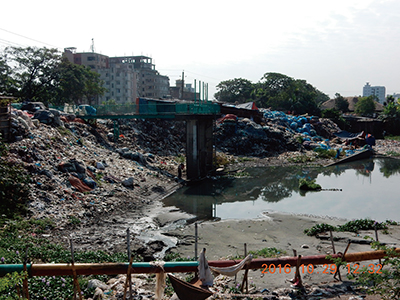 Illegally dumped waste at a river on the outskirts of Dhaka, the capital of Bangladesh (Photo: JICA)
Illegally dumped waste at a river on the outskirts of Dhaka, the capital of Bangladesh (Photo: JICA) Waste collection vehicles granted by Japan (Dhaka, Bangladesh. Photo: JICA)
Waste collection vehicles granted by Japan (Dhaka, Bangladesh. Photo: JICA)(B) Conservation of Biodiversity
The illegal trade of wildlife, which has worsened in recent years, has drawn international attention as one of the key sources of funding for international terrorist organizations. To help address the problem, Japan conducted a capacity building workshop on measures against illegal trade of wildlife in Malaysia, in cooperation with the UK in February, 2019. In addition, Japan provided elephant anti-poaching operation facilities in Uganda (April) and Mozambique (July), underscoring Japan's drive to address this issue seriously. Japan also participated actively in international negotiations on these matters, including the 18th meeting of the Conference of the Parties to the Convention on International Trade in Endangered Species of Wild Fauna and Flora (CITES) (held in Geneva, Switzerland) and the first meeting of the Open-ended Working Group on the Post-2020 Global Biodiversity Framework (OEWG1), held in Nairobi, Kenya, to discuss how these issues could be handled in the new framework that would succeed the Aichi Biodiversity Targets for the Convention on Biological Diversity (CBD).
Japan also contributed substantively to international discussions on the global conservation and sustainable uses of plant genetic resources for food and agriculture, with a view to enhancing sustainable agriculture and food security worldwide. At the eighth session of the Governing Body to the International Treaty on Plant Genetic Resources for Food and Agriculture (ITPGRFA), Japan contributed to the work of enhancing the multilateral system on access to genetic resources and the sharing of benefits, and at the forum, introduced Japan's gene bank initiatives (in particular, the development of unmanned, AI-based long-term storage systems for seeds), as well as its cutting-edge initiatives in the conservation and use of genetic resources, in collaboration with developing countries.
At the 55th Session of the Council of the International Tropical Timber Organization (ITTO), Japan engaged in discussions on the promotion of sustainable forest management and the establishment of timber supply chains that can track the flow of legally harvested timber and timber products.
(C) International Management of Hazardous Chemicals and Hazardous Waste
Japan also attended the 31st Meeting of the Parties to the Montreal Protocol on Substances that Deplete the Ozone Layer, held in November in Rome, Italy, to discuss matters such as the operation of the revised protocol with the addition of hydrofluorocarbon (HFC) as a controlled substance.
At the third meeting of the Conference of the Parties for the Minamata Convention on Mercury held in Geneva, Switzerland in November, Japan contributed to the establishment of international rules pertaining to the regulation of mercury through several ways such as the submission of a resolution proposed jointly with the European Union. Japan was elected as a member of the Implementation and Compliance Committee, after being recommended alongside with China and Jordan from the Asia Pacific region. Through this Committee, Japan works to promote the implementation of the Minamata Convention by verifying the contracting parties' compliance with the provisions of the Convention.
B Climate Change
(A) The United Nations Framework Convention on Climate Change, and the Paris Agreement
Global efforts are essential in reducing greenhouse gas emissions that cause climate change; however, the Kyoto Protocol adopted at the third session of the Conference of the Parties to the UN Framework Convention on Climate Change (COP3) in 1997 required only developed countries to reduce greenhouse gas emissions. The Paris Agreement was adopted at COP21 held in Paris in December 2015. The Paris Agreement is a fair and effective framework that provides that parties communicate their nationally determined contributions to greenhouse gas emission reductions and undertake efforts toward the achievement of such goals regardless of whether they are developed or developing countries. The Agreement entered into force in November 2016, and has been ratified by more than 180 countries including Japan (as of December 2019). In November 2019, the U.S. announced its withdrawal from the Paris Agreement.
Upon the adoption of the Paris Agreement, negotiations commenced on the implementation guidelines of the Agreement toward its full implementation after 2020, and these were adopted at COP24 held in Katowice, Poland, in December 2018. At COP25 held in Madrid, Spain in December 2019, the parties could not reach a complete agreement on negotiations for the implementation guidelines of the market mechanisms, which are carried over from COP24. It was decided that negotiations will continue at COP26 toward the adoption of the guidelines. On the other hand, concrete progress was observed on for agenda items such as loss and damage (loss and damage associated with the adverse effects of climate change), gender and climate change, and the impact of implementation of response measures (social and economic impacts arising from the implementation of mitigation policies and actions).
(B) Virtuous Cycle of Environment and Growth
Japan reached a Cabinet decision on the “Long-Term Strategy under the Paris Agreement as Growth Strategy” (hereafter, “Long-Term Strategy”) in June 2019, and submitted it to the United Nations Framework Convention on Climate Change (UNFCCC) Secretariat.
The Long-Term Strategy proclaims a “decarbonized society” as the ultimate goal, and aims to bring about the realization of “a virtuous cycle of environment and growth” with business-led disruptive innovation. In the financial sector, there are also moves that can lead to restraining the use of fossil fuels that emit large amounts of CO2 including coal, through engagement (encouraging invested companies to take action), divestments (withdrawing investment on assets related to fossil fuels) and others. However, divestment alone cannot address climate change. Rather, it is considered that investment in environment, society, and governance (ESG) to positively evaluate capital investments and innovation for decarbonization will attain further importance. To that end, it presents concrete measures to develop an environment for the mainstreaming of ESG financing, and to foster a proactive stance among corporations and financial institutions.
Moreover, all the G20 members agreed on the importance of the concept of “a virtuous cycle of environment and growth” at the G20 Ministerial Meeting on Energy Transitions and Global Environment for Sustainable Growth held in Karuizawa, Nagano Prefecture in June, and at the G20 Osaka Summit.
(C) Efforts in Supporting Developing Countries
Developed countries including Japan have provided various supports for developing countries so that those countries can implement sufficient climate change measures. Those supports include financial cooperation, capacity building, and technology transfer. From such perspectives, the Green Climate Fund (GCF) also plays an important role as a multilateral fund that provides support for developing countries to address climate change. In addition to its initial contribution of 1.5 billion US dollars (2015 to 2018), Japan expressed at the High-Level Pledging Conference for the GCF's First Replenishment held in October 2019 that it will contribute up to 1.5 billion US dollars. Serving as a board member of the GCF, Japan has actively participated in its management as well as policymaking. By December 2019, the GCF Board has approved 124 support projects, which are projected to abate CO2 emissions by 1.6 billion tons and reach about 350 million beneficiaries.
(D) Joint Crediting Mechanism (JCM)
The JCM is a mechanism for contributing to worldwide global warming measures, by evaluating contributions from Japan to GHG emission reductions or removals in a quantitative manner, and using them to achieve Japan's emission reduction target, through the application of its excellent low carbon technologies, as well as the implementation of mitigation actions in developing countries. As of December 2019, Japan has established the JCM with 17 partner countries, and implemented more than 160 projects related to the reduction or removal of greenhouse gases. In 2019, the initiative has steadily produced results, such as through the issuance of credits from projects in Laos, Mongolia, Viet Nam, Maldives, and Thailand.
(E) Japan's efforts in Climate Change and Fragility Risk
In response to suggestions at the Roundtable Seminar on “Climate Change and Fragility Implications on International Security” held in January 2017 and other fora, to which Japan will focus on the Asia Pacific and conduct studies and engage in discussions on climate change and fragility, Japan convened the International Conference on Climate Change and Fragility in the Asia-Pacific Region in 2019 following from the conference in July 2018, as one of its initiatives on climate change and fragility risk. The 2019 conference (although scheduled to be held in Yokohama in October, was reduced in scale due to Typhoon Hagibis and held online in November) was organized as a symposium based on the theme of climate change and the Pacific. Participants of various backgrounds introduced the latest scientific findings and initiatives related to climate change, and deepened understanding on the impact of the oceans on climate change and the role of the seas in climate change measures, as well as the approach that each party should adopt.
(F) Climate Change Measures by Non-State Actors
Measures by non-state actors such as private corporations, local governments, and NGOs are also important in tackling climate change. In Japan as well, non-state actors have made further progress in their efforts, as demonstrated by keen activities of the network of non-state actors, Japan Climate Initiative (JCI), which aims to take proactive action in the area of climate change, the Japan Climate Leaders' Partnership (JCLP), a corporate group with the same goal, and “RE Action – Declaring 100% Renewable,” a corporate group whose members have established the goal of procuring 100% renewable energy for the electricity required in the operation of their businesses, as well as the increase in the number of Japanese corporations participating in the international initiative “RE100” and the Task Force on Climate-related Financial Disclosures (TCFD)9. Japan aims to advance climate change diplomacy in cooperation with such initiatives by non-state actors.
- 9 The TCFD was established by the Financial Stability Board (FSB) as a task force on the disclosure of financial information related to climate change, led by the private sector. In its final report, it presented a framework on voluntary information disclosure by corporations pertaining to climate-related risks and opportunities.
(5) Arctic and Antarctic
A Arctic
(A) Current State of the Arctic, and Japan's Arctic Policy
There is a risk that rapid changes in the Arctic environment caused by global warming will have a drastic and irreversible impact on the ecology and the lives of those living in the Arctic, including indigenous peoples. At the same time, as the decreasing amount of sea ice is expected to expand the navigable area, there have been growing economic opportunities such as the use of the Northern Sea Route and the development of resources. Alongside this, Russia is promoting resource exploitation and freight shipping on the Northern Sea Route, while China has also published a white paper on its Arctic policy in 2018 and is observed to be proactively advancing into the Arctic. Against this backdrop, the U.S. is also enhancing its engagement in light of changes in the situation of the Arctic.
As for Japan, the Headquarters for Ocean Policy approved the “Japan's Arctic Policy” in October 2015 as its basic policy on the Arctic. In addition, the Third Basic Plan on Ocean Policy, adopted by the Cabinet in May 2018, added a separate section on Arctic policy for the first time and positioned it as one of the main policy items in Japan's ocean policy.
(B) Japan's International Activities on the Arctic
Japan has appointed an Ambassador in charge of Arctic Affairs. The Ambassador attends international conferences on the Arctic including the Senior Arctic Official's meeting of the Arctic Council (AC),10 in which Japan participates as an observer, and presents Japan's efforts and views on issues surrounding the Arctic. The fourth Trilateral High-Level Dialogue on the Arctic among Japan, China and the Republic of Korea (ROK), launched as the outcome of the Sixth Japan-China-ROK Trilateral Summit in 2015, was convened in Busan in June 2019, where a candid exchange of opinions was carried out on their Arctic policies. The seventh Arctic Circle Assembly11 was held in Iceland in October 2019, where the Ambassador in charge of Arctic Affairs delivered a speech on Japan's efforts considering Japan co-hosting the third Arctic Science Ministerial (ASM3) with Iceland, the current Chair of the AC, in November 2020. Japan will continue to secure the interests of Japan and the international community and contribute to solving global issues surrounding the Arctic.
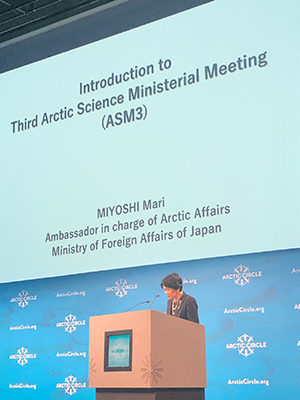 Ambassador in charge of Arctic Affairs delivering a speech at the seventh Arctic Circle Assembly (October 10-12, Reykjavík, Iceland)
Ambassador in charge of Arctic Affairs delivering a speech at the seventh Arctic Circle Assembly (October 10-12, Reykjavík, Iceland)In addition, Japan promotes international cooperation on the Arctic with the relevant countries including the Arctic countries. Through the Arctic Challenge for Sustainability (ArCS) project launched in FY2015, Japan promotes international cooperation for research and human resource development at research and observation stations in the U.S., Canada, Russia, Norway, and Greenland (Denmark). Japan has also sent its researchers to the AC working groups specialized in specific themes, where they present outcomes of their research on the Arctic and contribute to discussions. In addition, Japan invited Mr. Einar Gunnarsson, Chair of the Senior Arctic Officials of the Arctic Council, Ambassador for Arctic Affairs of Iceland and a group of Alaskan indigenous peoples to Japan in September and December 2019 respectively and provided them with opportunities for interaction and exchange of opinions with Japan's Arctic researchers to promote their understanding of Japan's efforts on the Arctic.
- 10 A high-level intergovernmental consultation body established in 1996 with the aim of promoting cooperation, coordination, and exchanges between the eight Arctic countries (Canada, Denmark, Finland, Iceland, Norway, Russia, Sweden, and the U.S.), while gaining the involvement of indigenous communities on common issues related to the Arctic region (in particular, sustainable development, environmental protection, etc.). (It is clearly affirmed that it does not address military and security issues.) Japan acquired an observer status in 2013.
- 11 An international conference established by Mr. Ólafur Ragnar Grímsson, former President of Iceland and others in 2013 and attended by about 2,000 participants including government representatives, researchers, and business people. Japan has been participating in it since the first assembly with the attendance of the Ambassador in charge of Arctic Affairs and other delegates. They deliver speeches at the plenary session, while Japanese researchers present the outcomes of their scientific research at breakout sessions.
B Antarctic
(A) The Antarctic Treaty
The Antarctic Treaty adopted in 1959 sets forth the following three basic principles: (1) the use of the Antarctica for peaceful purposes, (2) freedom of scientific investigations and international cooperation, and (3) a freeze on territorial rights and claims.
(B) The Antarctic Treaty Consultative Meeting (ATCM) and the Protection of Antarctic Environment
At the 42nd Antarctic Treaty Consultative Meeting (ATCM 42) held in Prague, Czech Republic, in July 2019, discussions were held on recent issues, including the microplastics pollution in the Antarctic Ocean, and the impact of the increase in the number of tourists on the Antarctic environment, taking into account the yearly increase in the number of travelers to the Antarctic region for tourism and other purposes.
(C) Japan's Antarctic Observation
As for Japan's Antarctic observation activities, based on the 9th six-year plan of the Japanese Antarctic Research Expedition (2016 to 2021), Japan is undertaking efforts to elucidate the role and impact of the Antarctic region on the global system, and in particular, to elucidate the actual conditions of global warming and its mechanisms. To that end, in addition to long-term continuous observation, it is also implementing various research and observation activities, including observation using large aperture atmospheric radar.



